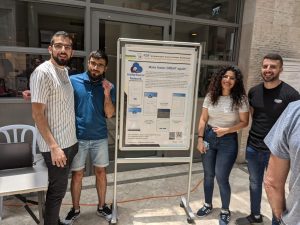Social Impact
When homework is an opportunity to help: Technion computer science students joined the Technion Social Hub to make their last-semester projects ones that assist communities and NGOs
Come end of term, the Henry and Marilyn Taub Faculty of Computer Science at the Technion held its annual projects fair, showcasing projects by undergraduate students in their final year. Given freedom to choose how they will apply the principles learned in the course of their studies, multiple groups chose to help the community, and more than one partnered with the Technion Social Hub to do so.
The students’ projects and the partnership with the Technion Social Hub present a unique opportunity: small NGOs often find themselves in need of a software solution but can neither find an existing platform to cover their particular needs, nor afford custom software. This is just the demand students can meet, at the same time gaining valuable experience in serving a client.
This year, three such projects stood out among the rest.
First, a project for Friends for Health, by Ido Yam, Tal Manheim, Yaakov Sherma, Illay Hai, and Daniel Shapiro, guided by Eytan Singher and Itai Dabran. Friends for Health is a nonprofit organization dedicated to helping people who cannot afford the life-saving medication they need. Their stock comes from donors who have unused medications that they are willing to donate. The Technion team wrote for the organization a computerized interface – for the patients, it guides them to the appropriate form for receiving the specific medication they need; for donors – organizing the donation, adding the possibility for medications to be collected from the donor’s home (necessary for medications with strict storage requirements); for employees – management functions. These functions, which we take for granted in a commercial company, were previously done manually in this important nonprofit. The students’ software would considerably shorten waiting times and enable Friends for Health to assist more patients.
A similar project was provided for Social Delivery by Lior Zelikman, Alex Chirkov, Yagel Meir and Tal Neoran, guided by Eytan Singher and Itai Dabran. Social delivery is an initiative offering logistical solutions for connecting between excess stocks of various objects (furniture, textiles, etc.) and NGOs needing those objects. Recently, they are also looking into adding companies replacing office furniture as potential donors. The students digitized for the first time the initiative’s donations, requests and storage tracking. The new interface even lets donors see their past donations and which NGOs they had helped.
A project of a different sort is the Hadar Social Network, by Haneen Jeries, Hussein Abu Jabal, Sami Hammoud and Haitham Kablan, guided by Elazar Gershoni and Itai Dabran. Hadar is considered a disadvantaged neighborhood in the City of Haifa, and the Technion is located nearby. Over the past years, the neighborhood has come to organize, and people started assisting each other however they can. But everything was happening over disjointed WhatsApp conversations, making it difficult to keep track of what was going on, or administrate the interactions. The students partnered with the neighborhood council to create a dedicated app, providing a smooth and secure process of connecting volunteers with people who need help. An administrator can ensure the security of the interaction, and a community social worker can use it to provide assistance.
These projects were by no means the only ones that sought to combine a homework assignment with a chance to do good. Other groups dealt with fair trade, donation of excess food from restaurants, accessibility mapping and more. For Technion students, academic success and helping those less privileged go hand in hand.





